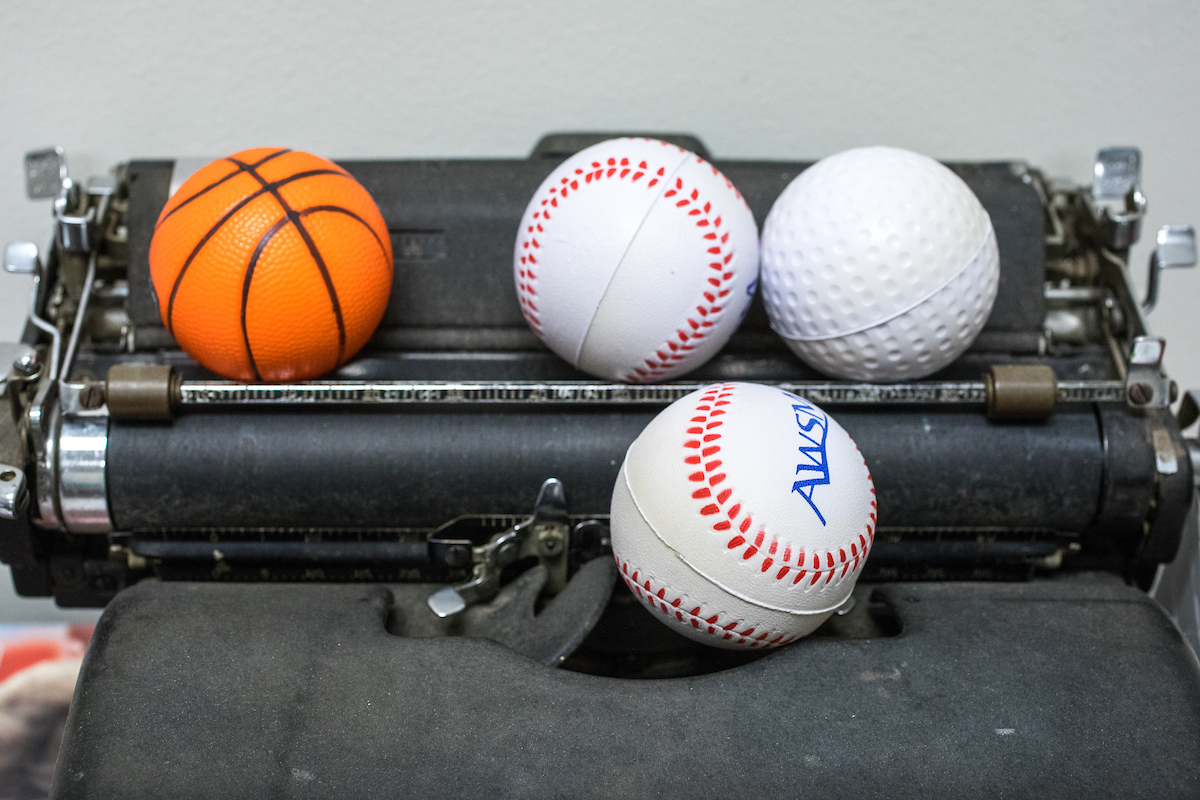Opening the female sports reporter's playbook
ASU Cronkite School professor Paola Boivin will discuss her hall-of-fame sportswriting career at Humanities Lecture Series
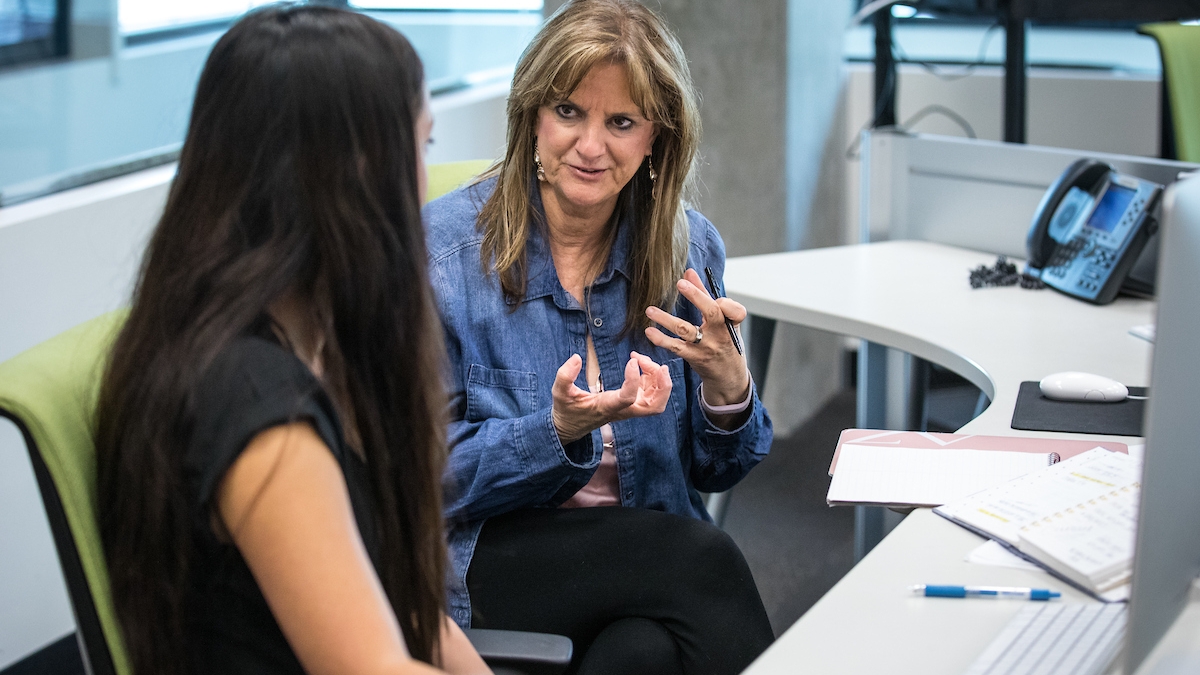
There was a day early in Paola Boivin’s hall-of-fame sports writing career when she nearly called it quits.
Her assignment was to interview St. Louis Cardinals third baseman Terry Pendleton at Los Angeles' Dodger Stadium. She walked into the visitors clubhouse, totally out of her depth, receiving a mixture of curious looks and catcalls. Seconds later she was intercepted by a bewildered Cardinals player, demanding to know why she was in their locker room. Was she there to interview somebody or was she simply in the mood to ogle a roomful of male anatomy?
“Right as he asked, a jock strap hit me on the shoulder,” Boivin recalled. “It was totally degrading, and I was almost reduced to tears. There were a couple of times I almost quit the business, but this was the most profound.”
Boivin will tell more stories and anecdotes about her 30-plus years as a journalist at the spring 2018 Humanities Lecture Series on March 1. Her presentation, “Women in Sports Reporting,” is hosted by Arizona State University’s College of Integrative Sciences and Arts and starts at 6:30 p.m. at the Walter Cronkite School of Journalism and Mass Communication (room 128), 555 N. Central Ave. in Phoenix.
The lecture series, now in its eleventh year, is open to the general public and is free.
Forever a sports maven, Paola Boivin keeps mementoes of a few of the disciplines she has covered on a manual typewriter in her office in the Cronkite Sports Bureau. Photo by Charlie Leight/ASU Now
Boivin is an award-winning sports columnist, who worked for The Arizona Republic for more than 20 years. She teaches in the Cronkite Sports Bureau and is the first full-time female employee in that division.
For the Arizona Republic and azcentral.com, Boivin covered numerous major sporting events, sharing her insightful commentary and game analysis. She also told the arresting human stories so often found in sports, those of long shots and underdogs.
Boivin said her love of sports started when she was young. Her father, an Army veteran who later worked in the scrap-metal business, often took her to Chicago White Sox games at Comiskey Park. She said it was a way for them to bond.
“My dad took the train into Chicago every day for work and frankly, he was a little grumpy when he got home,” Boivin recalled. “He was a crazy White Sox fan and when I’d go to the games with him, he was a totally different person. He was happy, he was upbeat and I thought, ‘What a cool environment.’ Those White Sox games is where it all started.”
Sports lit the spark, but seeing her name in print blazed the fire inside to become a writer. In high school she submitted a poem to Seventeen magazine, which eventually got published.
“It was a cheesy poem about teenage angst, but seeing my name in print was really cool,” Boivin said. “That cinched it for me.”
Boivin served on both her high school and college newspapers, covering intramural water polo, football and basketball for the latter. After graduating from the University of Illinois in 1982, she worked as a stringer for the Chicago Tribune covering local high school sports. Later she landed a job at the now-defunct Camarillo Daily News, a small newspaper approximately 50 miles north of Los Angeles. She worked there for four years, the last two as a sports editor. In addition to sharpening her writing, editing and design skills, Boivin had developed an eye for talent. She hired two unknowns who turned out to be great sportswriters: Tim Brown, now with Yahoo Sports, and Tom Krasovic, now with the San Diego Union-Tribune.
After four years, Boivin moved on to the much larger Los Angeles Daily News. There she covered the Los Angeles Rams and UCLA football and basketball, occassionally talking hoops over breakfast with legendary Bruins coach John Wooden. She also co-hosted a talk show with another reporter at KMPC radio. She said journalists like Lesley Visser, Melissa Ludtke and Christine Brennan had already broken barriers in the male-dominated world of professional sports, but the public still largely viewed her as "a novelty act."
“The adjustment was tough because when I started writing columns, people had a real problem with a woman with a strong voice talking about sports,” Boivin said. “I would literally receive ‘Get back to the kitchen’ type comments.”
She said acceptance came a few years later when readership feedback went from, “You’re an idiot sportswriter who doesn’t know what she’s talking about” to “You’re an idiot sportswriter.”
“I saw that as a real victory because they stopped mentioning my gender,” Boivin said. “It took a couple of years for people to see that I was serious about my craft. But it did take some time.”
Boivin had to prove herself once again when she and her then-fiancé (and now husband) Jay Dieffenbach moved to Arizona. She accepted a job with The Arizona Republic in 1994. This time the problem wasn’t the public — it was Boivin becoming comfortable with who she was and the subjects she chose to write about.
“When I was first given a column, the mistake I initially made was that I was trying to emulate the print version of talk radio and was outraged at everything,” Boivin said. “The reality is, that’s not who I am. I finally found my voice when I started writing about things I cared about.”
Boivin has covered almost everything in the sports world: Super Bowls, Olympics, Pac-12 sports, NHL, NBA and NCAA basketball, men and women's golf, Pat Tillman’s death, and the inception of the Phoenix/Arizona Coyotes and the Arizona Diamondbacks, including their 2001 World Series championship.
RELATED: Paola Boivin named to College Football Playoff selection committtee
In her columns, she developed a vivid and observational storytelling technique, weaving elements of social justice, diversity and humanity. Boivin has tacked issues such as Title IX, female empowerment, Confederate flags in sports, and a transgender golfer who dreamed about playing in the LPGA.
She said that motherhood gave her a better appreciation for sports and instilled a deeper empathy within her. Boivin said the hardest column she ever had to write was when Todd Heap, a former NFL player who also starred at ASU, was moving a truck in his Mesa driveway and accidentally ran over and killed his 3-year-old daughter.
“I struggled if we should cover or address the incident, and I ended up writing a column about how he needs the community right now and to be sensitive and embrace his situation,” Boivin said. “It was tough to write because I have kids and it really hit home for me. I couldn’t imagine dealing with that sort of tragedy."
That column coincided with Boivin’s exit from journalism, when she dipped her foot in the teaching waters. She offered to teach a master journalism class at Cronkite unpaid for a year because she was still covering ASU sports and wanted to avoid a conflict of interest.
“I fell in love with it (teaching) immediately,” Boivin said. “It’s something I’ve always wanted to do … and I was ready.”
Boivin was hired as a professor of practice by Cronkite School Dean Christopher Callahan in 2017, the same year she was inducted into the Arizona Sports Hall of FameBoivin has also won numerous awards from Associated Press Sports Editors and National Sportscasters and Sportswriters Association. She also served as president of the Association for Women in Sports Media in 2001 and earlier this year was as one of six new members to serve on the College Football Playoff selection committee. . Callahan called her a "tremendous addition" to the university.
“She’s not just a superb journalist, but Paola serves as an exemplary role model for the many young women at Cronkite who aspire to a career in sports journalism,” Callahan said. “She is a gifted, inspiring teacher and already has contributed greatly in her short time here at Cronkite. We are very fortunate to have her.”
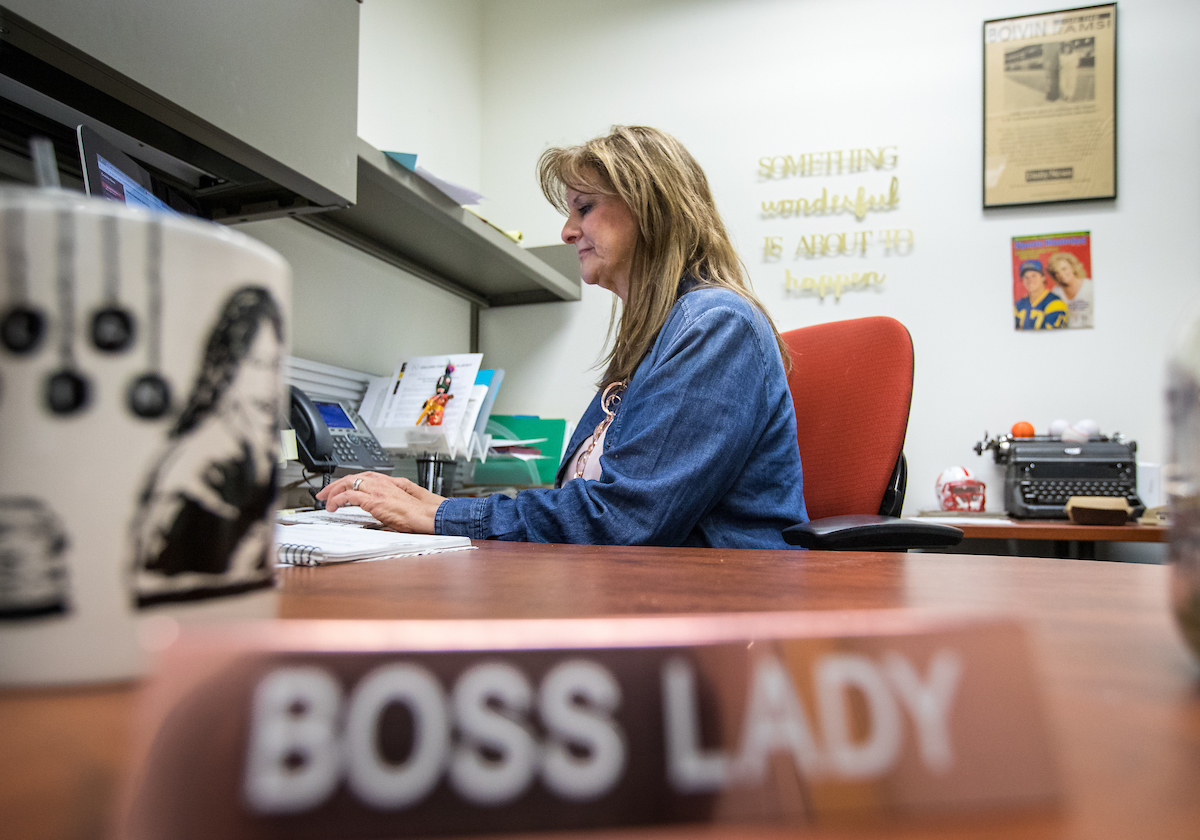
Cronkite School Professor — and Boss Lady — Paola Boivin works to mentor young female sports reporters. Photo by Charlie Leight/ASU Now
Boivin works in the Cronkite Sports Bureau, where she mentors young men and women on crafting stories, what it takes to be a good journalist, and how to conduct themselves in a professional manner. For women seeking careers in sports journalism, she has more pointed advice.
“I tell them that if a woman makes a mistake, she’ll get 10 times more flack than a male reporter,” Boivin said. “That’s just reality. The Cam Newton incident where he laughed at a female reporter’s question last year shows it’s still true. Women have to be cognizant they’ll be judged harshly.”
Boivin also has a message for people who attend her March 1 lecture: Continue to believe in the power of journalism and the people in the profession.
“Ninety-nine percent of reporters I know are good and honorable people and have the best intentions when they’re working on stories,” Boivin said. “More than ever, I believe in journalism.”
Top photo: Veteran sports reporter and current Professor of Practice Paola Boivin goes over Cactus League story pitches with sports journalism senior Katie Woo in the Cronkite News Room on Feb. 15. Boivin will speak at the Humanities Lecture Series on March 1 on the topic of "Women in Sports Reporting." She spent more than 30 years as a sports reporter and columnist, most recently with The Arizona Republic. Photo by Charlie Leight/ASU Now
More Law, journalism and politics
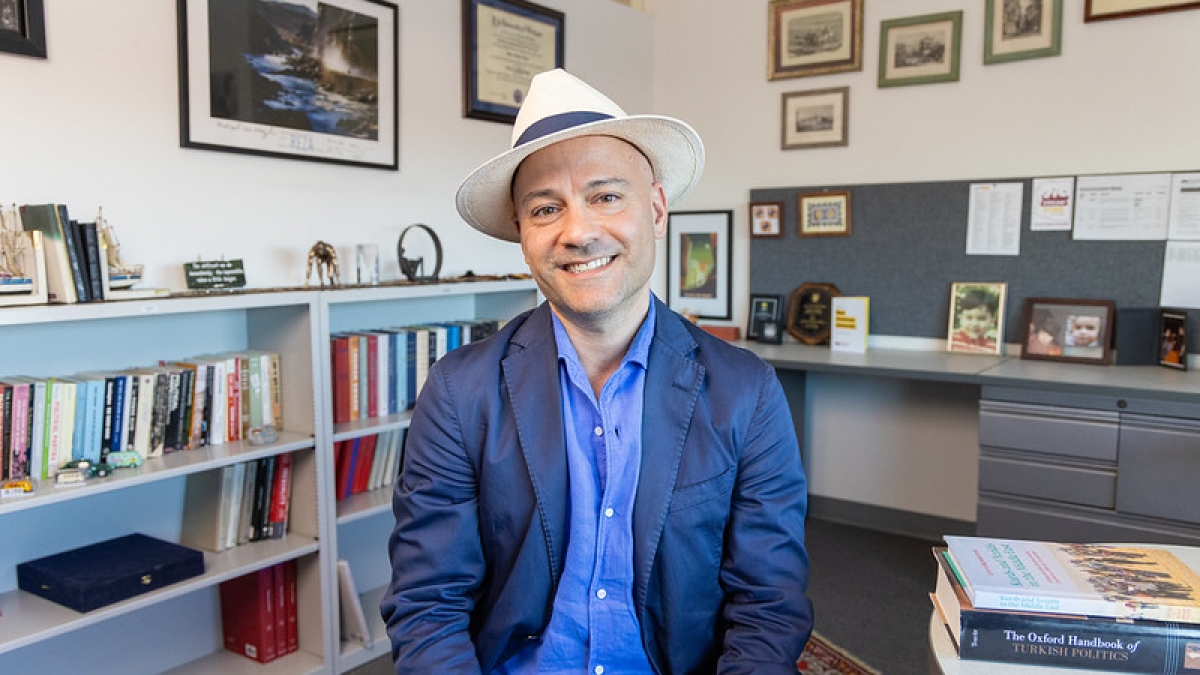
School of Politics and Global Studies director's new book explores mass violence
Why do people commit atrocities and why are certain groups, including religious and ethnic, more vulnerable to large-scale violence? These questions are explored in a new book by Güneş Murat Tezcür…
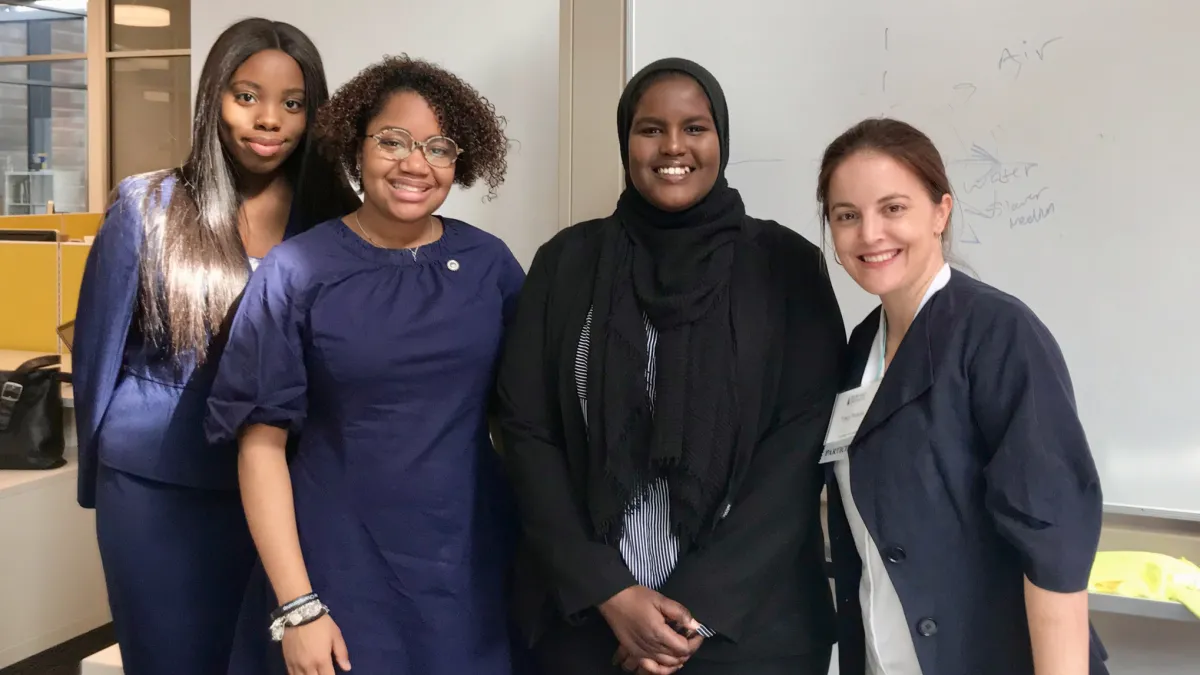
ASU faculty contributing to improvement of Wikipedia
Many academics have a love-hate relationship with Wikipedia. While the website has information about almost anything you can imagine, the credibility of that information is sometimes suspect. Tracy…

ASU Law students gain vital experience through Los Angeles location
Students at the Sandra Day O’Connor College of Law at Arizona State University may be concentrated in the school’s downtown Phoenix headquarters, but they have more choices than ever when it comes to…
